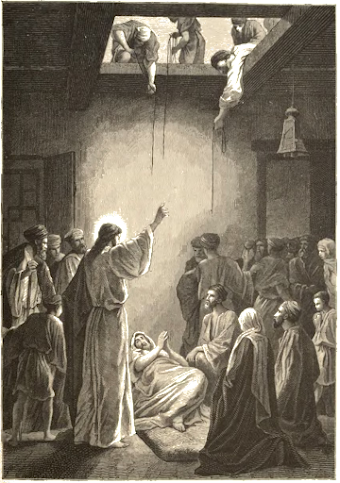They came bringing to him a paralytic carried by four men.
Unable to get near Jesus because of the crowd,
they opened up the roof above him.
The crowds often interfere with those who need to come into the presence of Jesus. It isn't necessarily through malice, as though they were intentionally trying to block the view. They just lack the awareness that their casual interest is creating a barrier from behind which those with genuine need can't get through. Sometimes these individuals manage to cry out or climb a tree to gain access to Jesus. But sometimes they are too crippled by need to be able to approach him on their own. If we don't aid such ones as these they may be left outside in the cold. And in order to actually be helpful to them we may have to be creative and get out of our own comfort zone just as did the friends of this paralytic.
After they had broken through,
they let down the mat on which the paralytic was lying.
When Jesus saw their faith, he said to him,
“Child, your sins are forgiven.”
They brought the man in seeking a physical healing. But Jesus preferred to address something deeper in the man's soul first. He did not want to mobilize a body only to leave it in the grip of sin. His priority was interior freedom first, physical freedom thereafter. Nevertheless, faith opened this man to receive greater than he sought. His desire led him to Jesus and Jesus revealed to him the truest need of his heart.
Now some of the scribes were sitting there asking themselves,
“Why does this man speak that way? He is blaspheming.
Who but God alone can forgive sins?”
They weren't wrong. And no doubt part of what Jesus wanted to do by using the paralytic as an example was to begin a process of self-revelation about just what was entailed in being the Son of Man, and what authority he possessed. Thus the external healing of the man would also serve as proof that the words he had spoken forgiving sin were not mere words. The power over the external physical world would hint at the inner divinity capable even of the forgiveness of sins.
Jesus immediately knew in his mind what
they were thinking to themselves,
so he said, “Why are you thinking such things in your hearts?
It must have been a little uncanny for Jesus to have read their hearts in this way. They did not think they were overheard since they were speaking among themselves. But Jesus "knew in his mind what they were thinking" and called them out on it. All of this was an invitation to glorify God as most of the crowd in fact did. But for some it was the beginning of the process of a hardening of heart. They weren't interested in a Son of Man who mediated forgiveness. They preferred to think they had their own spiritual situation well in hand. There was a bit of overlap between such an attitude and that of the people who demanded a king, since they were, by implication, rejecting God as their king. It is always appealing to be like the other nations, not ruled directly and immediately by God. Yet it is only in the Son of Man, when he reigns in our lives, can we find the freedom we desire. But when we do find it we are free indeed (see John 8:36).

No comments:
Post a Comment